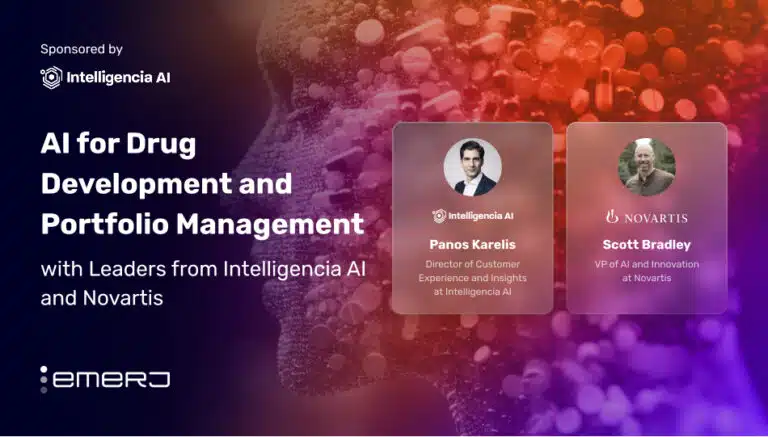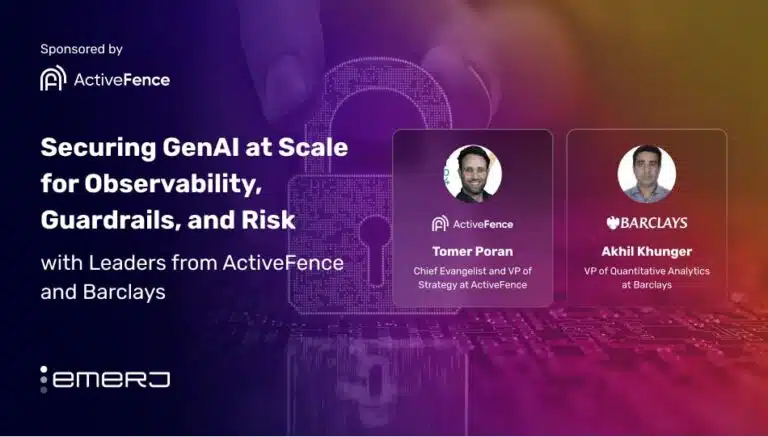Episode Summary: There’s a lot of venture money pouring into artificial intelligence in healthcare. From pharma to hospitals and beyond, the potential applications in healthcare are promising.
Late last year, we spoke for The World Bank about our proprietary AI in healthcare research, and speaking with governments, it’s clear that there are hurdles that healthcare companies have to overcome to access data for training AI systems.
Broadly, most of the folks that we speak with who are innovating in AI and healthcare are frustrated with how hard it is to streamline the data to make use of it for applications such as diagnosing illnesses.
But why is that? That’s a question that we asked our guest this week.
Our guest this week is Zhigang Chen, and he speaks about why this problem exists and how it can be overcome. In addition, Chen talks about the AI ecosystem in China and how it differs from Silicon Valley.
Subscribe to our AI in Industry Podcast with your favorite podcast service:
Guest: Zhigang Chen, Director of Healthcare Big Data Lab – Tencent
Expertise: Machine learning, AI adoption in healthcare
Brief Recognition: Chen earned his PhD in Computer Science from the University of Michigan and went on from a position at Yahoo to the Tech Lead at Twitter. He moved back to China and began working with two of country’s internet giants: first Alibaba and now Tencent.
Interview Highlights
(03:30) When you look from your vantage point, what barriers have to be overcome to make AI something that can really come to life in healthcare?
Zhigang Chen: This very question has been one of the focus of my thoughts, in the last two years. I’ve been thinking over why mobile health or in the AI in health, is not really taking off in the last few years. Like, mobile health has been the hype for a number of years, both in the states and also in China. The AI in almost everything, there’s big hype.
It didn’t meet a lot of people’s expectation. I think there is a gap. There’s a big gap between what the technology and the technology companies can offer, what the industry needs, or what the real world problems need. Take healthcare as an example. AI has offered a lot of wild expectations. But, what happened was when people try to apply the models, apply the AI system, in the real world, it didn’t work out quite well. That’s one.
And the second is, usually when we, as people who work in the technologies domain talk to you, the folks in the healthcare industry, we find there’s a mismatch. We thought that we were trying to solve their problems, but they said, “No, no, no. This is not the problem we wanna solve. We have these other problems.” There is a mismatch, in terms of priorities.
The [third] reason is about digitalization. In the healthcare industry, it has been there for a few thousand years.
So, if you look at that industry, the data is not quite there yet. The digitalization is not ready yet. So for AI, for big data to really take off, that foundation has to be somewhat ready. In the big data domain, we often say 80% of your time or research is spent on data, and then 20% of your time is actually on the models, on the algorithms.
Without that foundation of data and the digitalization, it’s hard, or it’s almost impossible to get really good models out of it. So that’s the third point, which is, without digitalization, without this whole process being online and being digitalized, how are you going to realize or how are you going to bring the value of the AI back to the business?
(08:30) What else can be done to solve that wrong expectation problem on both sides?
ZC: I think it’s a real driving force, could be the pressure from market competition. The reason I’m saying that is because, if you look at the sectors in the healthcare industry, there are markets where companies are making a lot of money. They can make easy money, like the medical equipment and stuff. But if you look at insurance, You add providers-side, the payers-side, and the pharmaceutical industry, these sectors, they’re already having a lot of competition from peers in the market.
So, if you’re in that market, if you wanna stay competitive, then you really have to open up your mind and open up your organization for this digitalization transformation and also for embracing the new technologies. I personally have seen this trend in the industry, in the last one to two years. I think a year ago I tried to reach out to an insurance company and they said, “No, no, no, we are not ready yet. We are happy to work with you guys, but we can’t give you guys our data.”
But the talk didn’t stop there, and then [last] year, in 2018, they actually reached out to us and it’s, “okay, we can bring our data to you guys. We can work together on this model and we really want to do this.”
So the driving force for them was that their leaders were having a lot of pressure from the market. Then they want to try to explore new forces for their growth. I think really the driving force is less from the, “okay let’s try to learn new things. Let’s try to do.” Those are not strong enough. I think that the real driving force is the competition to stay alive in the market.
(12:00) How are they going to deal with that tension? They don’t want to share anything, but they need this world to be a digital world in healthcare. How do you solve that?
ZC: I think the mindset has to be changed in all the tubes in order to really embrace the new technology and the whole flow of the data. You have to be open-minded. I think that mindset has to change.
The other thing is that for the healthcare industry, get your process online. Everything needs to be digitalized, and when the process is digitalized, then you have new data. You have a lot more data coming in and then you can try to optimize it and try and dig out new value out of your data. You’re going to gain more, on your business side, than worrying about what you’re going to lose in the process.
I think one of the problems is, what the difference is between eCommerce and healthcare is that, in eCommerce, there’s not such a high professional threshold as in healthcare. In healthcare, it’s about people lives. So we do have a lot of respect for the life sciences. It has its own rules and laws and the scientific stuff. There is a big hurdle to overcome for the technology people to work together with the life science people because they actually speak different languages. They look at the same problem from different angles.
I think there are short term solutions and there are also long term approaches.
The short term solution would really to have events, and then, both on the technology side and the healthcare side, on both sides, there are always people who are more ready to reach out to the other side. So these people can function as the bridge to get people together and also get ideas across to each other. I have talked to probably over 200 doctors in China to understand where they’re from and how they approach problems, what their interests are. And also I talk to government officials. I talk to the supply chain companies and all that.
So yes, I’m one of the technology people who actually understand the healthcare industry a little bit better. So, in my experience, I could actually communicate with the healthcare folks on the problem context.
I have seen people from the healthcare side who are very open-minded. They are very, very top notch doctors. They are very smart people, and they know what we’re trying to get across to them very easily. I think that’s kind of the relationship and also the collaboration kind of spirit that we want to establish in this domain.
So, I think China and the States and probably in other countries, there are already a lot of these events going on. Also, I think there is not a shortage of such events. I think it’s just that the industry, or the media, or the internet is flooded with all kinds of information. Some are good, some are actually not so true, so then people get confused about what AI can do. What if it’s just a false promise? It just takes time for people to absorb this evolution, this trend, that is happening.
So I think in the short term, I think it’s really the pressure from the market that is driving both sides to move forward hand-in-hand. I think that’s already happening. I think that’s probably a good thing to do, and also, I think having some small project to drive startups to work on these crossover problems, I think that’s good too.
Midterm and long term, I think it’s really about education. The data science has to be a foundation, mandate costs, for both life science and also the technology people. They have to spend more time in the foundation class like biology, bioscience, and all the stuff like that. I think that would actually be the mid and long term solution, so that people can understand what each other is talking about, where they are from, and how the technology can [facilitate a] better world and better society.
(17:30) When you say it needs to start with education, do you really mean that in terms of the college level? Or do you mean education within companies—the full ecosystem of how data science is being trained in general—needs to be more in context?
ZC: I think both, but I think the primary force should be on the university side. Once you are in the industry, often you don’t have much time to invest into such things unless there is something that’s driving you. But that’s also going to take some time. So, I think it’s really the university, the graduate school, that should invest more in this future midterm, long term solution.
(18:30) What are those factors that are playing to China’s hand right now in terms of AI that are working for them?
ZC: I’m not sure if it’s the trends or not but if you look at the payment sector, compare United States and China. China didn’t have an electronic payment system five years ago. But the United States has a very good payment system with credit card, with debit card. I think credit card’s probably the foundation for a very convenient payment system, in kind of a modern world.
But China didn’t have it. I remember while I was in China before I went to the states, I had to bring cash all the time. In the last five years, that has changed a lot. I haven’t used cash for a long time. And I just use mobile payment. But mobile payment didn’t skill as well in China as in the States. So what happened is that because the States already has a very good system, so for a new thing to replace the existing infrastructure, the threshold is very high. It’d have to do a lot better to replace the existing system.
But in China, I think that’s probably the same as the healthcare infrastructure, which is to say the healthcare infrastructure is not as good as the United States. So, for China or for the Chinese healthcare system to improve, to do better, then for them it’s probably a little bit easier to say, “Okay, let’s embrace new technology to new things so that we can do better.”
So I think that’s probably one of the factors, that the new technology could take off a little bit easier than in the developed countries. So that’s one. And then the other would be the competition. I think the market competition in China is very, very brutal, I’d say.
You have competition from a whole spectrum. You have competition from companies from the United States, from European countries. You also have domestic competitors. But, let’s say, in the States, you don’t look at competitors from China unless they are the big ones, right?
Even the big companies like Alibaba and Tencent, they are not competitors in the American market in a lot of sectors. So, for that, the Chinese market is a lot more crowded, because you have a lot more competitors.
The government is talking a lot about AI and how to use AI to really bring the economy to the next level, but it’s going to take a long time.
But, again, I think healthcare is probably [in a better position] because China [has] an aging population problem. The healthcare system is totally overwhelmed. So the healthcare system has to be more efficient. So that’s probably gonna force the government to embrace new technology in this industry, to make it more capable to meet the challenges down the road.
(25:00) What does the US have that you see as maybe different or unique from China, in terms of strengths in terms of AI?
I think the US has the best education system. I benefited a lot, and I’m still very grateful. I love the schools and the education system there. The second is, from this education system there, come a lot of good talents. Get concentrated in the bay area. I was very fortunate to work with a lot of very smart people in that area.
So I think education, talent-wise, I think US has a very strong advantage. The other is digitalization. It basically happened way earlier in various industries in the States. Also, I think the competition actually drives a lot of changes in the industry. For example, in the healthcare industry in the States, [digitization] had been around for many years, but that’s not the case in many other countries in the world. So I guess the digitalization put the US in a more advantageous position in the world.
Subscribe to our AI in Industry Podcast with your favorite podcast service:
Header Image Credit: Evariant
























